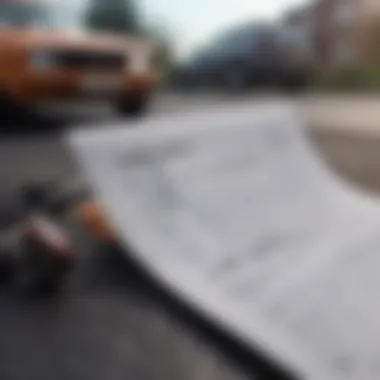Recovering Your Vehicle: A Complete Guide


Intro
Retrieving a vehicle from a towing company can be a daunting task. Understanding the circumstances that lead to this situation is crucial. Whether your vehicle has been towed due to a parking violation, mechanical failure, or for safety reasons, knowing your rights and responsibilities is essential.
This guide aims to break down the process of recovering your vehicle, highlighting the necessary steps and considerations involved, ensuring that vehicle owners are well-equipped to handle this challenging experience.
Coverage Options
When facing the potential of a tow, it is wise to consider the financial implications. Having insurance coverage can help mitigate some of these costs.
Types of Coverage Available
Several types of coverage options may assist you in covering the costs associated with vehicle recovery:
- Towing Coverage: This is an additional feature on many auto policies. It allows for reimbursement or direct payment of towing fees.
- Rental Reimbursement: This can help cover costs if you need to rent a vehicle after yours has been towed, typically for a specified duration.
- Roadside Assistance: Often associated with towing, this coverage provides services like jump-starts or fuel delivery, which may prevent the need for towing in the first place.
Liability Coverage Explained
Liability coverage is a standard component of car insurance. It protects you financially if you cause damage to another vehicle or property. However, it does not cover towing fees or vehicle recovery costs. When reviewing your insurance policy, ensure you understand what your liability coverage entails. Knowing the gaps can aid in selecting additional options that better suit your needs.
Key Considerations
Understanding your rights, the towing company's obligations, and the necessary documentation is vital in this process. Below are key considerations to be aware of when dealing with vehicle recovery.
Factors to Assess When Choosing Insurance
When choosing an insurance policy, several factors can impact your decision:
- Coverage Limits: Understand the maximum amount payable under each coverage type.
- Deductibles: Evaluate how much you are willing to pay before the insurance kicks in. A lower deductible might mean higher premiums.
- Provider Reputation: Research customer service and claims handling of potential providers.
Understanding Policy Limits
Insurance policies usually have limits, which dictate how much can be claimed in various scenarios. Reviewing these limits ensures you are not caught off guard by unexpected expenses, especially when recovering a towed vehicle.
"Being informed about your insurance can save money and reduce stress in a towing situation."
Epilogue
In summary, recovering a vehicle from a towing company requires a multifaceted approach. Assessing your insurance options, knowing your rights, and understanding the necessary documentation will empower you to navigate this situation effectively. Familiarity with the coverage options available will help ensure a smoother recovery process and potentially save costs.
Understanding Towing: Key Concepts
Towing and vehicle retrieval are significant topics for vehicle owners. Grasping the key concepts associated with towing helps to demystify the processes involved. Understanding these principles not only aids individuals in handling situations that require towing but also empowers them with knowledge regarding their rights and obligations.
Different Types of Towing
Towing is generally categorized into several types:
- Flatbed Towing: Involves placing the entire vehicle on a flatbed truck. This is often the safest method, reducing the risk of damage.
- Wheel-Lift Towing: Utilizes a hydraulic lift to raise the vehicle by its wheels. This method is common for simple repossessions or breakdowns.
- Hook and Chain Towing: An older technique using hooks and chains to lift vehicles. It carries a higher risk of damage and is less commonly used today.
- Integrated Towing: This approach is often used for large vehicles, employing a truck that has the towing mechanism part of its design.
Each type has specific applications and implications for vehicle condition post-recovery. Understanding these distinctions helps vehicle owners select the appropriate recovery method during emergencies.
Common Reasons for Vehicle Towing
Vehicles are often towed for various reasons, including:
- Illegal Parking: Often the most frequent cause. Vehicles parked in unauthorized spaces may be towed by property owners or municipalities.
- Accidents: Involved vehicles may require towing from an accident scene for safety and to clear roadways.
- Breakdowns: If a vehicle has mechanical issues, towing services assist in bringing it to a repair shop.
- Abandoned Vehicles: Vehicles left unattended for extended periods may be reported and subsequently towed.
- Violations of Local Ordinances: Cities may tow vehicles that do not comply with specific regulations, such as those violating residential street restrictions.
Recognizing these reasons allows owners to understand potential circumstances that may lead to their vehicle being towed.
Local Laws Governing Towing
Towing laws vary significantly between regions. Vehicle owners need to familiarize themselves with local regulations, as they dictate:
- Towing Procedures: How towing companies must operate when retrieving vehicles.
- Notice Requirements: Most jurisdictions require that owners be notified before their vehicles are towed, along with information about where vehicles are taken.
- Fee Structures: Local laws often regulate the maximum towing fees.
- Dispute Resolution: Laws may provide pathways for disputing charges or wrongful tows.


Awareness of these laws can protect owners from unjust removal of their vehicles and excessive fees.
"Knowledge of local towing laws is crucial for every vehicle owner and can prevent unnecessary expenses and frustration."
Initial Steps to Retrieve Your Car
Retrieving your vehicle from a towing company demands clarity and an organized approach. Understanding the initial steps is crucial, as it sets the stage for a smooth recovery process. If done right, these steps can save time and reduce overall costs. Knowing what to do first helps mitigate potential frustrations.
Verify Towing Details
Before taking any further action, it’s vital to confirm the specifics of your towing situation.
- Gather Information: Look for any documents or notifications related to the towing. This can include parking tickets or tow notices that were left on your windshield. Knowing the reason why your vehicle was towed is an essential start.
- Confirm Tow Location: Identify where your vehicle is currently located. This information can typically be found via the notice or through communication with local authorities.
- Check Time and Date: Understanding when your vehicle was towed can aid in determining if it was removed legally. Misunderstandings often arise, and being clear about facts helps you make informed decisions.
Locate the Towing Company
After confirming the details, the next task is to find the towing company handling your vehicle.
- Phone Directories and Websites: Utilize online search engines, local directories, or community forums to find the towing service.
- Local Authorities Assistance: If unsure, contact your local police station. They typically maintain records of all tow-related activities and can assist you in locating the correct company.
- Visit Their Offices: If feasible, visiting the towing company's office can sometimes be beneficial for immediate answers, especially regarding retrieval procedures.
Understand the Fees Involved
Having knowledge of the costs associated with retrieving your vehicle is critical.
- Breakdown of Charges: Tow companies often charge various fees—towing fees, storage fees, and additional administrative fees. Understanding these will help you prepare financially.
- Ask for a Detailed Invoice: When you contact the towing company, request a breakdown of all costs. This helps ensure transparency in what you need to pay.
- Be Aware of Payment Methods: Some towing services only accept cash, while others may allow credit or debit cards. Knowing this in advance can expedite the payment process once you reach the tow yard.
Taking these initial steps to retrieve your car is essential. By verifying towing details, locating the towing company, and understanding the fees, you pave the way for a less stressful recovery process.
Gathering Necessary Documentation
When recovering a vehicle from a towing company, gathering necessary documentation is a fundamental step. It ensures that you can prove ownership and have the necessary permissions to retrieve your vehicle. Having the right documents ready can significantly streamline the recovery process. This section breaks down the specific documents needed and their importance.
Proof of Ownership
Proof of ownership is essential when dealing with a towing company. This document demonstrates that the vehicle belongs to you. Common forms of proof include:
- Title of the vehicle
- Registration papers
- Bill of sale, if bought recently
Without this proof, the towing company might refuse to release your vehicle since they need verification to avoid any legal complications. To ensure a smooth retrieval, always carry these documents in a safe place in your car, or keep digital copies accessible.
Driver’s License and Insurance Information
Your driver’s license and insurance documentation play a vital role in the recovery process. The towing company will typically require:
- A valid driver’s license to confirm your identity
- Proof of insurance to show that the vehicle is covered
These documents protect both you and the towing company. Your driver’s license establishes your identity and right to operate the vehicle. Insurance papers confirm that you are financially prepared for any unforeseen expenses connected to the towing or any damage that may have occurred.
Towing Agreement and Release Forms
After verifying ownership and identity, the next key document is the towing agreement or release forms. These forms outline the terms and conditions for retrieving the vehicle. Typically they include:
- The name and contact details of the towing company
- Vehicle details, such as make, model, and VIN
- Fees that are applicable for the release
Completing and signing these documents signals your agreement to the towing company’s terms. It is critical to read these forms carefully before signing. Any discrepancies could lead to misunderstandings or additional charges.
Having all necessary documentation organized and ready will facilitate a smoother experience in recovering your vehicle. This step cannot be overstated; it sets the groundwork for a successful retrieval.
Contacting the Towing Company
Contacting the towing company is a critical step in the process of recovering your vehicle. This phase requires clear communication and a structured approach to ensure you obtain all necessary information and set the foundation for a smooth recovery experience. When you reach out to the towing company, your primary goal is to clarify your vehicle's circumstances and understand the recovery requirements. This is not just a procedural formality; it is essential for quickly resolving your situation.
Preparing for the Call
Before making the call, gather relevant information. Have your vehicle's make, model, and license plate number ready. Also, keep handy any details regarding the towing incident, such as the location and time your vehicle was towed. This will help you provide accurate information to the towing company.


Additionally, prepare a list of questions to ask during the call. Questions could include:
- What are the fees associated with retrieving my vehicle?
- What identification or documentation do I need to present?
- What is the process for recovering my vehicle?
Being organized will save you time and minimize frustration.
Inquiring About Fees and Recovery Process
During the call, inquire specifically about the fees you will face. Towing fees can vary significantly based on location, time, and the towing company's policies. Clarifying these costs upfront helps you avoid surprises. Typical fees may include towing charges, storage fees, and administrative fees.
Understanding the recovery process is just as important. You should ask questions like:
- What forms of payment are accepted?
- How long will I need to wait to retrieve my vehicle?
- Are there specific hours when I can pick it up?
This information will provide a clearer view of what to expect and how to prepare yourself.
Setting Up a Recovery Appointment
Once you’re informed about the fees and recovery procedures, it is time to set up the appointment for vehicle retrieval. Confirm the exact date and time when you will be allowed to pick up your vehicle. Ask whether you need to schedule in advance or if you can walk in during regular hours.
It is also wise to inquire about any potential delays or other factors that might affect your appointment.
- Tip: Document the date and time of your appointment and the name of the person you spoke with. This could be valuable should any discrepancies arise later.
In summary, contacting the towing company involves thorough preparation and clear communication. By understanding fees and setting an appointment, you pave the way for a more efficient vehicle recovery process.
Navigating Payment Procedures
Understanding how to navigate payment procedures following a vehicle towing is crucial. This section discusses payment methods accepted by towing companies, comprehending payment statements, and how to dispute any unfair charges. Knowing these aspects can lead to a smoother recovery process and help avoid unexpected costs.
Payment Methods Accepted
Each towing company has specific payment methods they accept. Generally, these can include:
- Cash: Many companies accept cash, offering a direct way to settle costs.
- Credit Cards: Most towing services accept major credit cards, making transactions convenient.
- Debit Cards: Similar to credit cards, debit cards are often welcome.
- Mobile Payment Apps: Some firms may also accept payments through apps like PayPal or Venmo, which can be faster and easier.
Before going to retrieve your vehicle, it is wise to confirm with the towing company what payment types they will accept. This can save time and prevent any complications at the recovery location.
Understanding Payment Statements
When recovering your vehicle, reviewing the payment statement is necessary. An itemized statement should list all charges clearly. Important elements to look for include:
- Towing Fee: The primary cost for transporting your vehicle.
- Daily Storage Fees: If your vehicle remains in the tow yard, storage fees often accrue daily.
- Additional Service Fees: Such as fees for winching or after-hours pickup.
By thoroughly understanding the statement, vehicle owners can ensure they are not overcharged. If any charges seem excessive or unclear, be prepared to ask for clarification from the towing company.
Disputing Unfair Charges
Should you encounter what you believe to be unfair charges, it is important to address them promptly. Here are some steps to consider:
- Gather Evidence: Collect any relevant documents such as towing receipts, photographs of the vehicle, or any previous communication regarding charges.
- Contact the Towing Company: Initiate a discussion with the towing service to express your concerns. Be firm but polite.
- Reach Out to Local Authorities: If needed, consult your local regulatory agency that oversees towing practices. They can provide guidance on your rights as a consumer and may help mediate disputes.
- Consider Filing a Complaint: If all else fails and you still feel the charges are unjust, consider filing a complaint with the Better Business Bureau or the Attorney General's office.
Remember, knowledge of your rights can empower you during this process. Staying calm and collected will aid in effectively communicating your concerns.
Navigating the payment procedures is an essential step in recovering your vehicle successfully. Being informed allows you to handle the process with confidence, minimizing stress during an already challenging situation.
Recovering Your Vehicle
Recovering your vehicle after it has been towed is a crucial aspect that can sometimes be overlooked in the chaos surrounding such an event. Understanding the procedures can save you time, money, and frustration. Knowing what to expect at the towing company yard, the necessary documentation, and the inspection process are all key elements in ensuring a smooth recovery.
The first step is to arrive at the tow yard prepared. It is important to have all required documents and understand what the recovery process entails. Being informed about potential fees and the procedures will help to avoid any surprises.
Additionally, the recovery of your vehicle is not just about reclaiming it; understanding the implications after retrieval can also protect you in the future. This preparation is pertinent as it establishes clarity and control over what can often be an overwhelming experience.
Arriving at the Tow Yard


Upon arrival at the tow yard, it is essential to approach the situation methodically. Typically, you will need to present specific documentation. Ensure you have your proof of ownership ready. This could include your vehicle registration or title. Having your driver’s license and insurance card is also crucial.
Most tow yard offices have open and accessible policies, but depending on your local laws, you might encounter certain restrictions. Try to arrive during regular business hours to avoid complications.
When you check in, be polite and clear about the reason for your visit. The staff is usually well-informed and can guide you through the immediate steps needed to access your vehicle. This initial interaction can set a tone for the process ahead.
Completing the Release Process
Completing the release process involves several steps that are primarily focused on ensuring all legal requirements are met. After verifying your identity and ownership of the vehicle, the towing company will provide you with a release form. This form often outlines any fees due for the towing services.
Be prepared to pay these fees upfront. Methods of payment may vary by company, so it's important to confirm what forms of payment they accept—cash, credit or debit cards, or even checks.
Read the release form carefully before signing it. This form is an important document as it can affect your rights regarding the vehicle after the release. If everything checks out, signing the document finalizes the retrieval process.
Inspecting the Vehicle
Once the vehicle has been released to you, inspection becomes a vital next step. Before driving away, ensure that the vehicle is in good condition. Look for any visible damage that may not have been present prior to being towed.
Inspect the side mirrors, headlights, and any visible dents or scratches. Take clear pictures and note any discrepancies. If you find damage, it is advisable to report it to the towing company immediately. Document everything carefully, as this can be helpful if you need to pursue any claims regarding the condition of your vehicle post-recovery.
"A thorough inspection not only safeguards your interest but also helps in establishing any potential liability that the towing company may hold regarding damage during the towing process."
Ensure to check if any items are missing from inside the vehicle. In some cases, personal items can be accidentally misplaced during the towing process.
In summary, recovering your vehicle from a towing company involves careful preparation, understanding of the release process, and thorough inspection. Each of these components plays an essential role in ensuring a successful recovery experience. Being equipped with the right knowledge and approach will alleviate much of the inherent stress that comes from such situations.
After Vehicle Retrieval: Next Steps
Recovering your vehicle is often just the first step in the process. Understanding what to do after retrieval can have significant implications for your future interactions with towing companies, authorities, and your own insurance provider. This section emphasizes the importance of reflecting on your experience, preventing future issues, and addressing any impacts on your insurance.
Reviewing Your Towing Experience
Once you have successfully recovered your vehicle, it’s important to take a moment to review the overall experience. This includes evaluating the towing company's behavior, your understanding of the fees, and how well you were informed throughout the process. Consider asking yourself the following questions:
- Was the towing company transparent about the reasons for towing?
- Were the fees clearly communicated before retrieval?
- Did the towing company meet legal regulations established in your area?
Documenting your experience can be insightful. Not only does it help in resolving any disputes later, but it also aids you in considering the quality of service provided by the towing company. This review may also assist you if you encounter similar situations in the future or if you need to file a complaint.
Understanding Future Preventive Measures
Preventing future incidents of towing begins with awareness. Familiarize yourself with local parking regulations and ensure awareness of any temporary towing circumstances, like construction zones or special events. Here are some preventive measures to consider:
- Always check signage in parking areas to ensure allowed parking times.
- Be cautious of street cleaning schedules and temporary notices.
- Consider using apps or tools that track parking regulations in your area.
Additionally, maintaining an orderly parking area at your residence or business can reduce the likelihood of your vehicle being towed. If you have visitors or employees who park, inform them of good practices to avoid towing situations.
Addressing Implications with Insurance Providers
Engaging your insurance provider after recovering your vehicle is a vital step. It can be beneficial to discuss your situation to fully understand the implications of towing on your coverage. Here’s what to keep in mind:
- Report the towing incident: This ensures that your insurance provider is aware of the incident, which may be necessary for any claims.
- Discuss potential claims: If your vehicle sustained any damage during the towing process, document this thoroughly and share it with your insurance agent.
- Review your policy terms: Some policies have specific clauses related to towing incidents. Make sure you understand how this may affect your premium or coverage in the future.
Taking these steps can help you mitigate potential financial or legal pitfalls in the future. While the recovery of your vehicle is important, ensuring that you are prepared for similar situations can save time and money down the road.
Ending
In the realm of vehicle recovery, understanding the process is paramount. This article distills the key elements of retrieving a vehicle from a towing company, providing a roadmap for vehicle owners facing this challenging situation. Recovery is not simply about securing one's car; it encompasses an entire journey from understanding the initial towing to post-retrieval considerations. Hence, the importance of being well-informed cannot be overstated.
Summarizing Key Points
The steps outlined throughout this guide are designed to simplify what can often be a confusing experience. Key points include:
- Verify Towing Details: Know where your vehicle was taken and why it was towed.
- Contacting the Right Company: Identifying the correct towing firm expedites the return process.
- Documentation Requirements: Keep vital documents ready for easy access. This includes proof of ownership and identification.
- Understanding Fees: Familiarize yourself with the potential costs to avoid surprise charges.
- Post-Recovery Steps: Review your towing experience and enhance your knowledge for future prevention.
This summary not only consolidates your learning but also reinforces the importance of each step in the recovery process.
Reinforcing the Importance of Preparedness
Preparedness is essential when dealing with vehicle retrieval. Anticipating the various scenarios that could lead to a tow empowers vehicle owners to act swiftly and efficiently. Here are some aspects to consider:
- Know Your Local Laws: Understanding local rules regarding towing can prevent unnecessary disputes.
- Maintain Updated Documentation: Having current paperwork ensures smoother transactions at the tow yard.
- Develop a Recovery Plan: Plan your approach before a towing situation arises to alleviate stress during emergencies.
- Insurance Awareness: Some insurance policies may cover towing expenses. Check your coverage beforehand.



